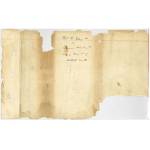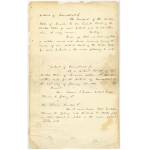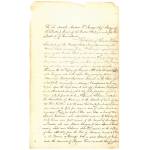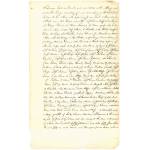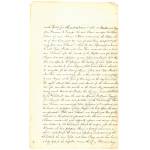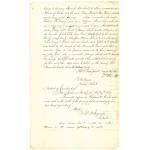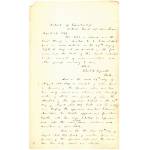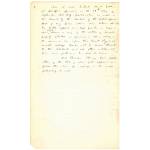Libel of Thomas R. Gedney
8/29/1839
Add to Favorites:
Add all page(s) of this document to activity:
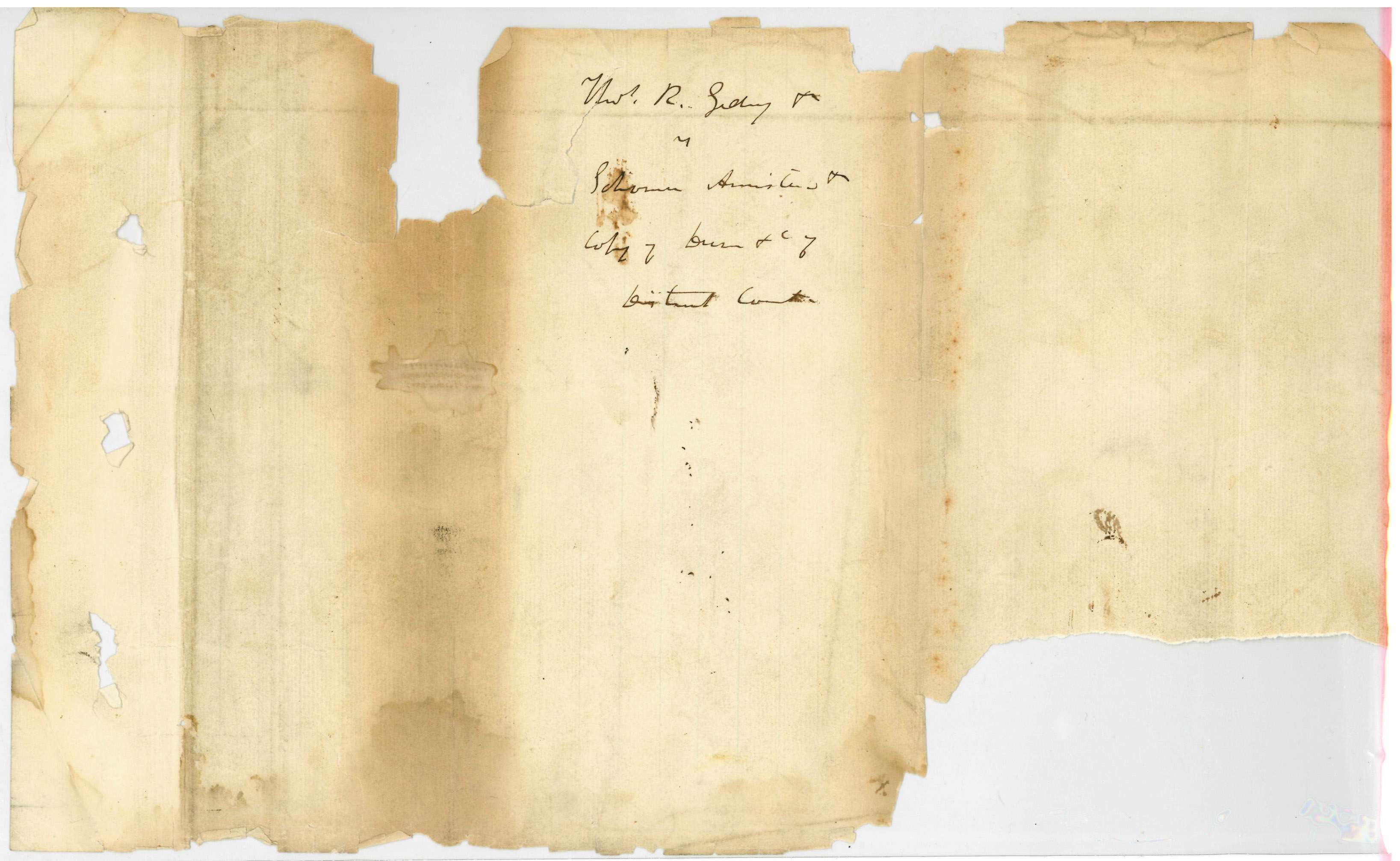
Add only page 1 to activity:
Add only page 2 to activity:
Add only page 3 to activity:
Add only page 4 to activity:
Add only page 5 to activity:
Add only page 6 to activity:
Add only page 7 to activity:
Add only page 8 to activity:
In February 1839, Portuguese slave hunters abducted a large group of Africans from Sierra Leone and shipped them to Havana, Cuba, a center for the slave trade. This abduction violated all of the treaties then in existence. Two Spanish plantation owners, Pedro Montes and Jose Ruiz, purchased 53 Africans and put them aboard the Cuban schooner Amistad to ship them to a Caribbean plantation. On July 1, 1839, the Africans seized the ship, killed the captain and the cook, and ordered Montes and Ruiz to sail to Africa.
Instead, they sailed north; and on August 24, 1839, the Amistad was seized off Long Island, NY, by the U.S. brig Washington. The schooner, its cargo, and all on board were taken to New London, CT. The plantation owners were freed and the Africans were imprisoned on charges of murder.
The murder charges were dismissed, but the Africans continued to be held in confinement and the case went to trial in the Federal District Court in Connecticut. The plantation owners, government of Spain, and captain of the Washington each claimed rights to the Africans or compensation.
The document shown here is the libel – an accusation brought against someone or something claiming property ought to be seized – that Washington commander Lt. Thomas R. Gedney submitted to district court Judge Andrew T. Judson.
In maritime law, compensation is allowed to persons for salvage claims – if their assistance saves a ship or its cargo from impending loss. Gedney and his crew believed they were entitled to salvage rights in the amount of $65,000. At that time in U.S. history, even individuals acting in their official capacity as officials of the government were entitled to salvage rights.
Because he sought salvage of the schooner and its cargo, Gedney was very detailed in his account and itemized all of its cargo. He estimated its value at $40,000, and the value of the Africans as slaves at $25,000. In maritime law, compensation is allowed to persons whose assistance saves a ship or its cargo from impending loss. The libelants claimed that with great difficulty and danger to themselves they recaptured the Amistad from the Africans. They claimed that had they not seized the vessel, it would have been a total loss to its "rightful" owners.
Gedney described the encounter with the Amistad. In addition, Gedney relayed that the Africans could speak only native African languages and that one of the two Spanish plantation owners, Jose Ruiz, spoke English. Gedney included Ruiz's account of the mutiny in his libel.
Abolitionists decided to use the Amistad incident as a way to expose the evils of slavery and generate significant opposition to the practice. They hired attorneys to serve as proctors for, or represent, the Africans, and submitted an answer to the libels of Gedney and the plantation owners conveying the position of the Africans.
The court ruled that the case fell within Federal jurisdiction and that the claims to the Africans as property were not legitimate because they were illegally held as slaves. The U.S. District Attorney filed an appeal to the Supreme Court.
In January 1841, former President John Quincy Adams argued the defendants' case in the Supreme Court. He defended the right of the accused to fight to regain their freedom. The Supreme Court decided in favor of the Africans, and 35 of them were returned to their homeland. The others died at sea or in prison while awaiting trial.
Instead, they sailed north; and on August 24, 1839, the Amistad was seized off Long Island, NY, by the U.S. brig Washington. The schooner, its cargo, and all on board were taken to New London, CT. The plantation owners were freed and the Africans were imprisoned on charges of murder.
The murder charges were dismissed, but the Africans continued to be held in confinement and the case went to trial in the Federal District Court in Connecticut. The plantation owners, government of Spain, and captain of the Washington each claimed rights to the Africans or compensation.
The document shown here is the libel – an accusation brought against someone or something claiming property ought to be seized – that Washington commander Lt. Thomas R. Gedney submitted to district court Judge Andrew T. Judson.
In maritime law, compensation is allowed to persons for salvage claims – if their assistance saves a ship or its cargo from impending loss. Gedney and his crew believed they were entitled to salvage rights in the amount of $65,000. At that time in U.S. history, even individuals acting in their official capacity as officials of the government were entitled to salvage rights.
Because he sought salvage of the schooner and its cargo, Gedney was very detailed in his account and itemized all of its cargo. He estimated its value at $40,000, and the value of the Africans as slaves at $25,000. In maritime law, compensation is allowed to persons whose assistance saves a ship or its cargo from impending loss. The libelants claimed that with great difficulty and danger to themselves they recaptured the Amistad from the Africans. They claimed that had they not seized the vessel, it would have been a total loss to its "rightful" owners.
Gedney described the encounter with the Amistad. In addition, Gedney relayed that the Africans could speak only native African languages and that one of the two Spanish plantation owners, Jose Ruiz, spoke English. Gedney included Ruiz's account of the mutiny in his libel.
Abolitionists decided to use the Amistad incident as a way to expose the evils of slavery and generate significant opposition to the practice. They hired attorneys to serve as proctors for, or represent, the Africans, and submitted an answer to the libels of Gedney and the plantation owners conveying the position of the Africans.
The court ruled that the case fell within Federal jurisdiction and that the claims to the Africans as property were not legitimate because they were illegally held as slaves. The U.S. District Attorney filed an appeal to the Supreme Court.
In January 1841, former President John Quincy Adams argued the defendants' case in the Supreme Court. He defended the right of the accused to fight to regain their freedom. The Supreme Court decided in favor of the Africans, and 35 of them were returned to their homeland. The others died at sea or in prison while awaiting trial.
This primary source comes from the Records of District Courts of the United States, 1685 - 2009.
National Archives Identifier: 2787899
Full Citation: Libel of Thomas R. Gedney; 8/29/1839; Thomas R. Gedney v. Schooner Amistad; Case Files, 1790 - 1911; Records of District Courts of the United States, 1685 - 2009, Record Group 21; National Archives at Boston, Waltham, MA. [Online Version, https://docsteach.org/documents/document/gedney-libel, April 20, 2024]Rights: Public Domain, Free of Known Copyright Restrictions. Learn more on our privacy and legal page.



